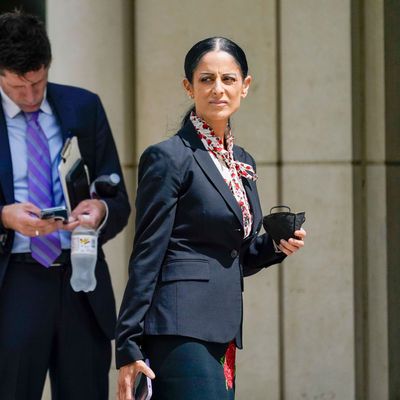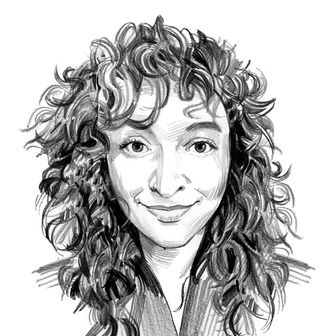
The word “herpes,” delivered three times in rapid-fire succession, marked a turning point for R. Kelly’s sex-crimes and racketeering trial Thursday. These proceedings have always had the potential of going off the rails, for a variety of reasons — from coronavirus to turbulence on his legal team — but it seemed closer to descending into absurd theater than one might have expected this early in the game.
Here is how it started: Around 4 p.m., Assistant U.S. Attorney Nadia Shihata started questioning Dr. Kris McGrath, Kelly’s longtime physician, about his medical history, specifically with regard to sexually transmitted disease. McGrath, who was subpoenaed to testify against his patient of 20 years, revealed that Kelly had undergone treatment several times for curable bacterial infections. When Kelly saw McGrath on June 5, 2000, complaining about bumps on his penis, things changed. McGrath saw two possibilities: Kelly said he was wearing leather pants for a photo shoot, raising the possibility of routine skin irritation; or, he could have genital herpes. While Kelly tested negative for herpes, McGrath said that another diagnostic indicator was that he prescribed valaciclovir, an antiviral medication for herpes that made Kelly’s symptoms subside — leading him to confidently make a herpes diagnosis. This determination was only solidified over the years: Every time Kelly had an outbreak of “blisters or bumps,” he got better after taking this medication.
“He called to request a prescription for what he called ‘the blue pill,’” McGrath said. “The phone calls seemed to be frequent for the blue pills.” So often were Kelly’s requests, McGrath “memorized the phone number” to his pharmacy. (As it turns out, the pharmacy was kitty-corner from a McDonald’s where R. Kelly allegedly met one of his accusers.) McGrath eventually told Kelly to take the medication every day, not just to combat flare-ups. The whole point of prosecutors’ questioning on Kelly’s apparent herpes was to establish that he was well-aware of his diagnosis, as evidence in their allegations that he gave it to partners without telling them.
Then came the defense’s cross-examination. Nicole Blank Becker — who, during her opening statement, accidentally told jurors that they had to find Kelly “guilty” before correcting herself — tried to engage McGrath in a dialectical on the nature of herpes.
“So when it comes to herpes, obviously that’s a hot topic,” Becker said, asking shortly thereafter: “You can say 100 percent he has herpes?”
“I feel that 100 percent he has herpes.”
“Are you saying, as in, ‘I feel like it’s freezing in here’?”
“Is that a question?” McGrath responded matter-of-factly, later saying: “I believe that 100 percent, [based on] his exam, the treatment that he had, and the response to therapy.”
Well, can’t you use the herpes med to treat other things?, Becker asked.
“Herpes. Herpes. Herpes,” McGrath responded.
At one point during this exchange, R. Kelly appeared to chew gum, his white N95-style mask bouncing up and down with each jaw movement.
This exchange didn’t just mark a single bizarre moment in Kelly’s trial — most trials, be they for low-level perps or high-profile defendants, have their off moments. But it came hours after another one of Kelly’s defense lawyers, Deveraux Cannick, tried to trip up accuser Jerhonda Pace in a similarly eyebrow-raising way.
Pace had testified that she was 14 when she met Kelly in April 2008, at his Chicago child-pornography trial. She alleged that Kelly first engaged in sex acts with her in May 2009, when she was 16.
“One year and one month,” Cannick said, noting that her age had changed by two years within slightly more than one.
“My birthday is April 19,” Pace pointed out.
“You told us [in] April 2008, when you met Robert, you were 14?” Cannick pressed, although Pace’s birthday meant that she would be 16 during her first sexual encounter with Kelly.
“And a year and a month later, you were 16 years old … you advanced two years in a year and a half?”
“That’s correct,” Pace said. (She was indeed correct.)
Cannick also tried to rattle Pace on her reason for leaving a party at Kelly’s house. Pace had said during direct testimony that she and her friend left after about 30 minutes because the music was too loud. Had she ever gone to parties before?, Cannick asked.
Cannick then asked, “Were any of them hosted by African Americans” — his implication seemingly being that parties hosted by Black persons were loud.
Prosecutors objected, and Judge Ann Donnelly sided with them.
“Move on, Mr. Cannick,” Donnelly said.
Testimony in R. Kelly’s case continued Friday morning, and with it came more cross-examination. Anthony Navarro, who had worked as an assistant for Kelly, was subpoenaed by the prosecution to testify about everything from security at his house to tour-bus logistics to Kelly’s female guests. (Navarro, who started working for Kelly in summer 2007 and continued for about two and a half years, now has his own recording studio.) Becker asked Navarro about bathrooms and locks. This isn’t entirely surprising — some of Kelly’s accusers were allegedly kept locked in rooms and denied bathroom access.
Becker, who established that there were separate staff tour buses, one for men and the other for the dancers, who were women, asked Navarro: “On these buses, there were bathrooms?” He replied, “Yes.” She asked whether the lock was on the inside or the outside. “In other words, you go into the restroom, you lock it from the inside?” He replied yes.
“Were there any rules?”
“The only rule was that you can’t take a No. 2, because it will travel [with us],” and the driver would get angry, he said.
“It would, for lack of a better word, stink up the place?” Becker said.
Navarro replied in the affirmative again.
Becker did see some successes, however. While Navarro initially said there were times people couldn’t leave — because they either couldn’t get a ride or couldn’t get ahold of Kelly — he conceded “they could walk out the door.” Navarro also said that when he directed guests to rooms, they did not lock from the outside, saying they were “just regular” doors. Navarro also said that the female guests he picked up did not look underage, more like 21 or 22, and that he never saw Kelly engage in sexual activity. He claimed to have seen Kelly engage in verbal abuse toward employees. Becker pointed out he had told prosecutors the opposite during his interview with them in 2020. Navarro said he thought he had coronavirus during that sit-down, impacting what he had said.
When prosecutors had a chance to requestion Navarro, they further probed the work environment. They asked whether his experience working with Kelly was similar to others. Navarro said “no.” How was it different, they pressed.
“It was a weird time for me. The things you had to do was just a bit uncomfortable. The music and production stuff was really good. All the other stuff was kind of strange,” Navarro said. “It was almost like The Twilight Zone. You went into the gate and it was like a different world, just a strange place.”
Navarro said he’s worked with other big artists at gigs — such as Taylor Swift, Jay-Z, and Kayne West — and it was “normal.” They kept it professional, he said. There was no “personal stuff” he had to do in working with them.
This is a developing story and will be updated accordingly.


